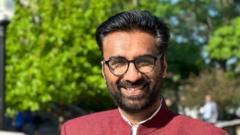Badar Khan Suri, a scholar specializing in conflict studies, has found himself embroiled in a legal battle in the United States after being arrested on March 17 on terrorism charges linked to his connections with a Palestinian activist. His journey began 15 years ago when an invitation from a classmate led him to join an international aid convoy to Gaza, a decision that would alter his life dramatically.
During that trip, he met Mapheze Saleh, the daughter of a former adviser to Hamas, eventually marrying her shortly after. The couple spent nearly ten years in India before relocating to the US, where Suri became a postdoctoral fellow at Georgetown University. However, his life took a sudden turn when police arrested him at his Virginia home, citing "close connections to a known or suspected terrorist" as the basis for his detention.
This arrest has alarmed his acquaintances and colleagues in India, who describe Suri as a diligent and soft-spoken scholar without any real ties to terrorism. His friends argue that his engagement in the Palestinian cause is academic, falling squarely within his professional focus as a conflict studies expert. Traditional views on the Israeli-Palestinian conflict suggest that Suri's analytical perspective should not be conflated with criminal activity.
While Suri’s deportation is currently staved off by a US court, the unfolding situation mirrors broader tensions surrounding US immigration policies, particularly during the Trump administration, which intensified scrutiny on activists advocating for Palestine and other marginalized issues. Critics assert that this examination often overlooks the nuances and complexities of individual cases such as Suri’s.
One notable aspect of the case is Suri's marriage to Saleh, who is American by citizenship yet possesses familial ties to Hamas due to her father's past advisory role within the group. This relationship has played a central role in the allegations against him, further complicating an already intricate narrative surrounding national security and individual freedom of expression.
Suri’s father has expressed deep concern for his son’s plight, insisting that the allegations are baseless and regretful, emphasizing that Suri’s only "crime" is marrying a Palestinian woman. The case continues to unfold, raising critical questions about the intersection of research, personal beliefs, and the legal system within the geopolitically charged context of the Middle East. As the academic community observes Suri's ongoing struggle, there remains hope that truth and justice will prevail in a landscape fraught with political complexities.


















